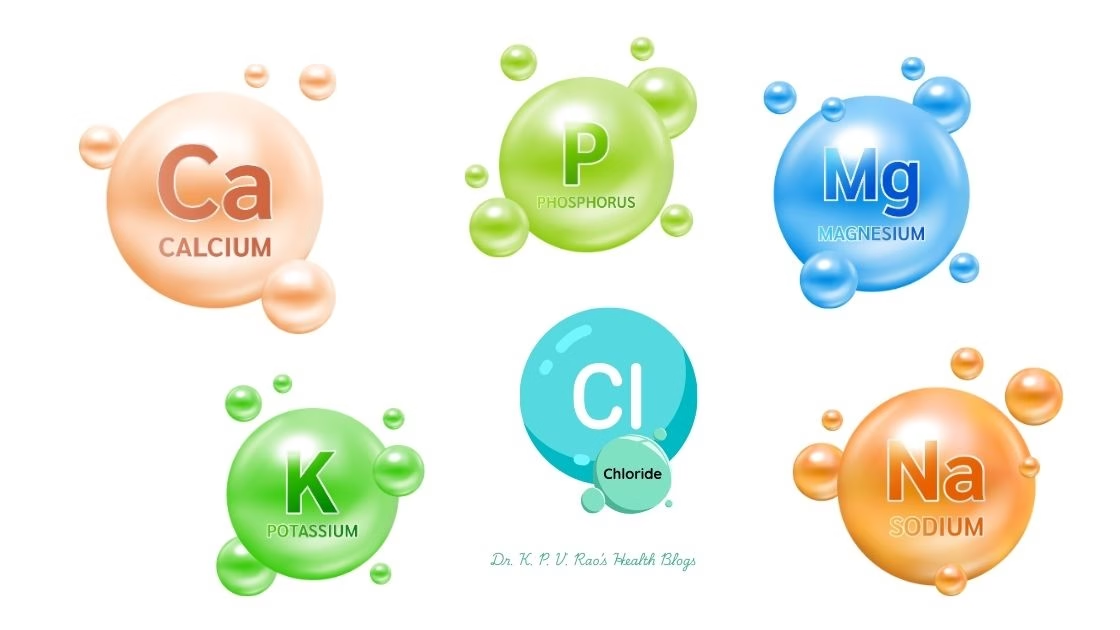The Importance of Serum Electrolytes
What are Serum Electrolytes?
Serum electrolytes1 are vital blood minerals that regulate key bodily functions like nerve signaling and muscle contraction.
Electrolytes are charged particles, both positive (anions), and negative (cations), which help regulate a variety of critical functions in the body.
They are tiny helpers in your blood that keep your body working the right way.”
The major electrolytes in our body
Electrolytes in your blood help your body do important things like move muscles and send signals through nerves.
The primary electrolytes include sodium, potassium, calcium, magnesium, chloride, bicarbonate, and phosphate.
Each of these minerals plays a unique yet interrelated role in maintaining physiological equilibrium.
The measurement of serum electrolytes is typically conducted through a blood test, commonly known as an electrolyte panel. In India, it is popularly known as Serum Electrolytes Test.
This diagnostic tool evaluates the concentration levels of key electrolytes, providing valuable insights into an individual’s health status.
Electrolyte levels can vary due to several factors, including hydration status, underlying health conditions, medications, and dietary intake. Therefore, understanding serum electrolyte levels is fundamental for diagnosing ailments related to dehydration, kidney dysfunction, and heart conditions.
Why should you learn about Serum Electrolytes?
I will try to answer this question by sharing with you the experience of low serum electrolyte in one of my patients.
Case study
Once, just before the Covid-19 pandemic, I was called upon to make a home visit to check upon my patient who was undergoing treatment for diabetes as well as hypertension and was having exteme weakness.
This patient was lying on her bed unable to get up and move about even though she was fully conscious. The first thought that crossed my mind was that the patient may be having low blood sugar levels. I carry a glucometer with me in my visit bag, so I did a quick random blood sugar test, which I found to be within normal range.
Then I checked her pulse and oxygen level using pulse oximeter. Both were in normal range.
Next, I checked her blood pressure, which turned out to be extremely low for her age- about 70/40 mm of Hg [Normal range- 120/85 mm of Hg].
I immedately got her Serum Electrolytes done. The result- serum Sodium level was extremely low- about 104 mEq/dl [normal range-135 to 145 mEq/dl].
This low level of sodium- termed Hyponatremia- was the culprit which was causing her extreme weakness.
I admitted the patient under a physician in a hospital where she was administered appropriate IV fluids for a few days and she recovered fully.
Summary of the story- Nowadays due to health awareness, everyone undergoing treatment for hypertension is over conscious, so much so, that they avoid normal salt in their diet, whereas we doctors advise salt restriction and not salt exclusion. This can have deleterious consequences like the one discussed above.
As this article is quite exhaustive, I have split this article into 2 parts. In the first part we will learn the Importance of serum electolytes.
In the next we will learn about individual electrolytes and their the causes and symptoms of their imbalance.
The roles of Serum Electrolytes- 7 essential facts
Serum electrolytes are to the body what oil is to a machine; both are essential for smooth operation and proper functioning. The roles of serum electrolytes extend to numerous bodily functions.
As mentioned above, serum electrolytes include sodium, potassium, calcium, magnesium, chloride, bicarbonate, and phosphate, which are crucial for various bodily functions.
The Seven Essential Facts of Serum Electrolytes
Before we begin, let’s leran about the 7 essential facts of serum electrolytes- here are the facts:
- Sodium helps regulate blood pressure and fluid balance,
- Potassium is vital for muscle function and nerve signaling.
- Calcium is essential for bone health, muscle contraction, and blood clotting; it contributes to muscle function and neurotransmitter release at synapses.
- Magnesium supports muscle and nerve function.
- Chloride maintains fluid balance and is part of digestive juices,
- Bicarbonate helps regulate pH levels in the body.
- Both sodium and potassium are vital for nerve function and muscle contraction, ensuring that electrical impulses are transmitted effectively throughout the nervous system and enabling muscles to contract and relax appropriately.
What causes electrolyte imbalance?
Serum electrolyte levels can be affected by diet, medications, illnesses, and hydration status.
Electrolyte imbalances can lead to health issues such as dehydration, kidney problems, and heart arrhythmias.
Regular monitoring of serum electrolytes is important for people with chronic conditions, athletes, and those undergoing certain medical treatments.
Moreover, electrolytes are integral in maintaining adequate hydration levels within the body, as well as regulating the acid-base balance, which is crucial for metabolic processes.
Their concentration must remain within specific ranges, as imbalances can lead to potentially severe complications.
In short, serum electrolytes are essential regulators of bodily functions, and maintaining their balance is critical for overall health and well-being.”
Major Electrolytes and Their Functions
Serum electrolytes play a crucial role in maintaining various physiological functions within the body.
Among the most significant electrolytes are sodium, potassium, calcium, magnesium, chloride, bicarbonate, and phosphate.

The Normal values of Serum Electrolytes
Each of these electrolytes has defined normal values in the blood and serves specific roles critical to our health.
Sodium is the predominant extracellular cation, with normal levels typically ranging from 135 to 145 mEq/L. It plays an essential role in regulating blood pressure and maintaining fluid balance.
Sodium is also vital for nerve function, as it helps generate action potentials in neurons, enabling communication throughout the nervous system.”
Potassium, primarily found within cells, has normal serum levels between 3.5 and 5.0 mEq/L. This electrolyte is important for muscle contraction, including that of the heart, and helps regulate heartbeat.
Balanced potassium levels are crucial for the proper function of the kidneys and for the acid-base balance of the body.”
Calcium is a critical mineral with normal serum levels ranging from 8.5 to 10.5 mg/dL. It contributes to bone health and plays a significant role in muscle contraction, nerve transmission, and blood clotting.
Calcium interacts closely with magnesium and phosphate, further illustrating the interconnectedness of serum electrolytes.”
Magnesium, with normal levels between 1.7 to 2.2 mg/dL, is another intracellular electrolyte essential for numerous biochemical reactions.
It supports muscle and nerve function and also influences blood glucose levels and blood pressure.”
Magnesium levels often correlate with those of calcium and potassium, indicating a complex relationship among these elements.”
Chloride, with normal values of 98 to 106 mEq/L, helps maintain osmotic pressure and fluid balance, primarily functioning in tandem with sodium.
Bicarbonate is crucial for maintaining the body’s acid-base balance, with normal levels around 22 to 28 mEq/L.
Phosphate, with levels of 2.5 to 4.5 mg/dL, is vital for energy production and cellular function.
Understanding these major electrolytes reveals their essential contributions to various body functions, highlighting the importance of maintaining their balance for overall health and well-being.
Useful Resources-
To be concluded….
We stop here for this article. In my next article, I will discuss the importance of each electrolytes and what to expect if there is an imbalance.
Share this article-
If you hhave found this article useful, do share it on the social media channels shown below. You can also click to tweet here-
7 Essential Facts About Serum Electrolytes for Health and Wellness Share on XAdios.

